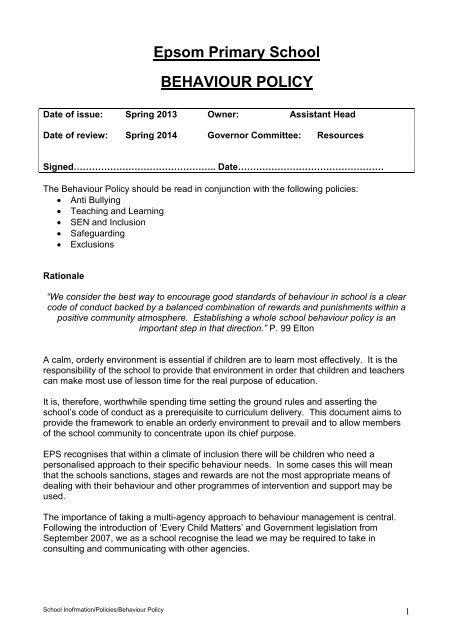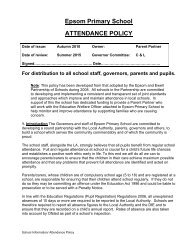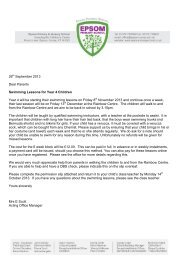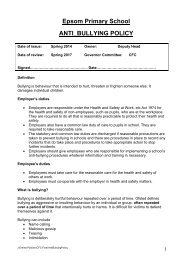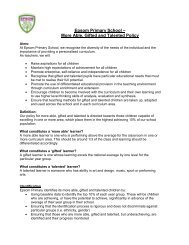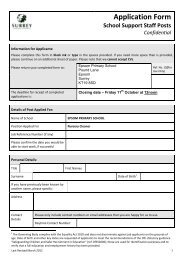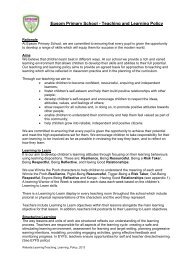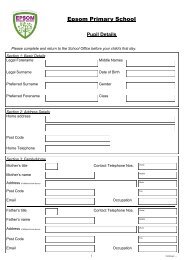Behaviour Policy - Epsom Primary School
Behaviour Policy - Epsom Primary School
Behaviour Policy - Epsom Primary School
You also want an ePaper? Increase the reach of your titles
YUMPU automatically turns print PDFs into web optimized ePapers that Google loves.
<strong>Epsom</strong> <strong>Primary</strong> <strong>School</strong>BEHAVIOUR POLICYDate of issue: Spring 2013 Owner: Assistant HeadDate of review: Spring 2014 Governor Committee: ResourcesSigned……………………………………….. Date…………………………………………The <strong>Behaviour</strong> <strong>Policy</strong> should be read in conjunction with the following policies: Anti Bullying Teaching and Learning SEN and Inclusion Safeguarding ExclusionsRationale“We consider the best way to encourage good standards of behaviour in school is a clearcode of conduct backed by a balanced combination of rewards and punishments within apositive community atmosphere. Establishing a whole school behaviour policy is animportant step in that direction.” P. 99 EltonA calm, orderly environment is essential if children are to learn most effectively. It is theresponsibility of the school to provide that environment in order that children and teacherscan make most use of lesson time for the real purpose of education.It is, therefore, worthwhile spending time setting the ground rules and asserting theschool’s code of conduct as a prerequisite to curriculum delivery. This document aims toprovide the framework to enable an orderly environment to prevail and to allow membersof the school community to concentrate upon its chief purpose.EPS recognises that within a climate of inclusion there will be children who need apersonalised approach to their specific behaviour needs. In some cases this will meanthat the schools sanctions, stages and rewards are not the most appropriate means ofdealing with their behaviour and other programmes of intervention and support may beused.The importance of taking a multi-agency approach to behaviour management is central.Following the introduction of ‘Every Child Matters’ and Government legislation fromSeptember 2007, we as a school recognise the lead we may be required to take inconsulting and communicating with other agencies.<strong>School</strong> Inofrmation/Policies/<strong>Behaviour</strong> <strong>Policy</strong>1
AimsThis behaviour policy will: Identify the roles and responsibilities of members of the school community inrelation to encouraging and promoting good behaviour. Identify the roles and responsibilities of members of the school community inrelation to discouraging unwanted behaviour. Reward and celebrate children’s achievements in behaviour. Be fair and consistent, helping children to manage their own behaviour and givingthem the tools to be able to manage their own behaviour.The chief aims of our approach to behaviour are: The maintenance, encouragement and promotion of good behaviour whereverpossible. The shared and agreed identification of what we consider to be unacceptablebehaviour. The establishment and shared understanding of class and school rules. Agreed sanctions where rules are broken. A firm, consistent approach across the school. A shared understanding of what will happen if… The involvement of children – encouraging children to take responsibility of theiractions. The discussion with children in circle time, assemblies/SEALS and PSHE about theneed for rules and the responsibilities we each have to one another. A readiness to look for a variety of strategies in those cases where children cannotconform to the normally expected patterns of behaviour, which does not overrideour behaviour system, but compliments it. The use of a multi-agency approach wherever appropriate.Promoting Good <strong>Behaviour</strong>It is important that we try to remain as positive as possible at all times. We have asupportive school with a caring ethos. In order to make the most of this it is expected thatthere will be a number of means within the school of rewarding and celebratingachievement and good behaviour. These include:In class Public display of the names of children who have been praised in the form of HousePoints. Reward time display of children rewarded each day due to following the schoolrules Every class having a ‘bouncy ball’ jar for collection of balls awarded for goodbehaviour of the class following the school rules. Frequent and achievable collaborative rewards.<strong>School</strong> Inofrmation/Policies/<strong>Behaviour</strong> <strong>Policy</strong>2
Monday Achievement assemblies Opportunities for children to show and talk about their achievements and interests,both in school and outside of school. Postcards to celebrate learning behaviours Head teachers award for collection of house points Class attendance and behaviour cups Announcement of the total number of house points leading towards a rewardchosen by the school council.On display The maintenance of wall displays demonstrating work of which children are proud Praise names in class on the House Point chart Bouncy Ball jar Termly behaviour and achievement badge winners Reward chart for children who follow the school rules each dayIn the newsletter/Excellence at <strong>Epsom</strong> The names of children receiving any awards given Names shared of children receiving lunchtime behaviour reward of sitting on the toptable. Other children who are to be congratulated for particular achievements,competitions etc.End of each termA special ‘awards’ ceremony to celebrate the achievements of the school, pupils and staffover the term. Attendance awards Bronze. Silver and Gold <strong>Behaviour</strong> badges Achievements badges Most house points in each house House point winner badges.Other opportunities to celebrate include: Musical evenings and concerts – where children can demonstrate their talents The issuing of swimming certificate and other certificates from sporting activities The announcement of the performance of sports teams in newsletters andassemblies. <strong>School</strong> Council involvement. Stars in the community board recognising achievements outside school <strong>Epsom</strong> <strong>Primary</strong> in the community board, celebrating how we are part of thecommunity as a school.<strong>School</strong> Inofrmation/Policies/<strong>Behaviour</strong> <strong>Policy</strong>3
Rules and sanctionsWhole school rules: Care for everyone and everything Show good manners at all times Follow instructions straight awayWhat is considered inappropriate behaviour? Calling out and interrupting people Running inside school Not following instructions Distracting others Swinging on a chair Leaving the classroom without permission Name calling or being rude to others Not looking after school property or other peoples equipment Not sitting on the carpet properly Not lining up quietly or being silly going into class Reacting inappropriately to being reminding about behaviour Any other behaviour that an adult feels is inappropriateIf a child behaves in this way the following sanctions will be used:Early yearsIn the early years children will be reminded of our expectations and, if necessary, will sit ina reflection area in the classroom for time out. If the behaviour is considered moreextreme (see below) time out with a Senior Leader member will be given and individualreward strategies may be used after discussions with parent, SENCo and <strong>Behaviour</strong> leadYears 1-6Children who are behaving inappropriately will be told that they are on a step and will beexplained the reason why. This step will be recorded and the following sanction will begiven for each step. Step 1= Loss of 5 minute reward time Step 2= 5 minutes time out in reflection area in class Step 3= 5 minutes time out in reflection area in phase leader’s classroom and 10minutes loss of playtime Step4= Sent to SLT member and time will be spent working in another class (lengthdecided by SLT member) The parents will be contacted via a text message and aHead Teacher letter o explain the reasons.In exceptional cases, children may get more than one day’s internal exclusion or receive afixed term exclusionPlaytime and LunchtimesDuring playtimes and Lunchtimes children who behave inappropriately will receive adetention. This will take effect immediately so that the sanction does not continue over tothe next day (wherever possible). Detentions will be taken in a set room by a member of<strong>School</strong> Inofrmation/Policies/<strong>Behaviour</strong> <strong>Policy</strong>4
the Senior Leadership Team. If a child receives a detention over 15 minutes, 2 in oneweek or 6 in a term, their parent will be informed via a text message.The following detentions will be given 5 minute detentions-- Being in school without permission- Running inside of school 15 minute detentions-- Playing an inappropriate game- Throwing food- Winding others up or using unpleasant language 30 minute detentions-- Disrespecting school property- Being rude or answering back- Trying to hurt other children 60 minute detentions-- Refusing to do what an adult has asked- Fighting or spitting- Swearing at anybody Up to 60 minute detentions-- Any other inappropriate behaviourMore Serious <strong>Behaviour</strong>The following behaviour is deemed to be very serious and requires input from the Headteacher or Deputy Head. Parents are likely to be involved as a matter of urgency.a) Bullyingb) Unprovoked serious physical abuse of a childc) Physical abuse of on adult employed/volunteering in the schoold) Racial abuse of anyone in the schoole) Carrying a weapon or illegal substancesf) Running out of school during the school day or internal exclusiong) Deliberately missing lessons by hiding in an area of the schoolh) Doing something that constitutes danger to another child e.g. pulling a chair away<strong>Behaviour</strong> Out of <strong>School</strong>Pupils are expected to uphold the reputation of the school whenever they are out of schoolwhether they are taking part in an official school trip/outing or wearing their uniform to andfrom school. Pupils may be subject to disciplinary sanctions if their behaviour brings theschool into disrepute or has repercussions for the orderly running of the school.EPS cannot be responsible for pupil behaviour when they are out of school but willendeavour to investigate any incident which is reported to the school. The school willalways cooperate with the Police in any investigation of incidents which are thought toinvolve EPS pupils.<strong>Epsom</strong> <strong>Primary</strong> <strong>School</strong> Good Practice for Pupils with <strong>Behaviour</strong>al DifficultiesChildren will follow the behaviour steps. Children with specific behaviour difficulties will begiven extra support, where needed to follow our school rules. These include:Personal Card with class rules on the desk<strong>Behaviour</strong> target on the desk<strong>School</strong> Inofrmation/Policies/<strong>Behaviour</strong> <strong>Policy</strong>5
<strong>Behaviour</strong> plan with personal behaviour targets for pupil to discuss their behaviourand log when target is achievedReward for achieving target chosen by childDesired behaviour = rewardNo desired behaviour= no rewardLog incidents when target not achieved on SIMsAgreed timeout locationConsequences for poor behaviour known in advance and followed throughIf timeout is taken, class rules apply again as soon as the pupil rejoins the lessonand work may need to be completed in homework club.Extreme <strong>Behaviour</strong>Following Government and LEA guidance, Education and Inspections Act 2006, schooldiscipline and behaviour policies, the SLT will execute emergency restraint as a last resorton pupils who are:o at risk of injuring themselveso at risk of injuring other pupilso at risk of injuring adultso at risk of damaging school propertyRestraint at EPS means:o holding hands to stop them from hurting otherso holding arm at wrists or forearmo placing hands in centre of back and shepherding awayo pushing/pullingThe head teacher also has the power to search pupils if they suspect a child is carryingsomething that may cause an offence. At EPS this will normally be done after the headteacher contacts the parents and with another member of staff. In an emergency the headteacher will do this with another adult present.All incidents of restraint and search must be recorded, logged and placed in the child’sconfidential file.Please note that it is the policy of this school, that no adult working in the schoolwill run after or follow an angry child. Children should be left to calm down unlessthey are at risk of injuring themselves or others when restraint may be used as alast resortMulti-agency meetingsWhere children do reach a level of fixed-term exclusion it is likely that they fall into thecategory of having a high-level of need and could be categorised as BESD. At this point(or before) it might be appropriate to call a professionals meeting to discuss a PastoralSupport Plan (PSP). At this meeting plans will be made to minimise possible permanentexclusion.The people called to this meeting should include:o the head teachero the class teacher<strong>School</strong> Inofrmation/Policies/<strong>Behaviour</strong> <strong>Policy</strong>6
o Parent Partnero a TA involved with the children as part of BESD provisiono a member of the relevant external agencies (social services, health service,educational psychologist, <strong>Behaviour</strong> Support, EWO, Traveller Support).o a representative from the LEA, (exclusion officer)o parentsThe outcome of this meeting should be discussed by the head teacher with the parents, ifnot present and the child themselves. A review date should also be set.Children with Social, Emotional & <strong>Behaviour</strong> difficulties who exhibit extremebehaviour (BESD)In most cases, difficulties with behaviour will be dealt with by the sanctions and processesalready described. However, in some cases the normal procedures used may have littleeffect upon the child. This might be because of other circumstances at home or becauseof medical conditions. In some cases children have a very low self-esteem and find itdifficult to find a place for themselves within the normal school routines and reward/sanction process.In these cases different approaches will be necessary and ‘personalised’ according to theneeds of the child. Options for supporting children who fall into this category include:o temporary part-time timetables as part of reintegration following an exclusion.These would be negotiated between parent, child and class teacher and are alwaysseen as a temporary measure enabling children to find a positive base from whichto increase their time in school.o parents accompanying children into school – in some cases children maybenefit from parents being involved with them on school site. Once more this wouldrequire negotiation and support from all parties concerned.o Support from a TA. A highly experienced group of TAs are on standby to providesupport and encouragement (social skills group) for individuals who may lack theconcentration to stay in class for the full school day. In some cases they will workwith children in class to give the support and encouragement they need. In others,they may remove the child from class to provide an alternative personalisedcurriculum. Once more the emphasis will be upon raising self-esteem of the child,basing the work upon their individual needs and interests and finding ways ofmotivating them within class.o Adapting the curriculum – in some cases children will not be able to cope all daywith the set curriculum. It may be that in the afternoon alternative arrangements aremade and more practical, ‘fun’ type activities arranged to keep them on track. Thismight take form of a rewarding activity for the child and a friend after a successfulday. It might also include class rewards as peers have helped the child to remainincluded.o Individually adapted reward cards and stickers – some children will respond toindividual rewards tailored to their interests and level of concentration. Theseshould be negotiated between the child, class teacher and TAs. In some casesparents might also be involved in further supporting at home and the school ParentPartner may be involved.o Mentoring – some children will find it difficult to work with a number of people butmay benefit from establishing particular links with one individual in the school whocan act as a mentor, normally the Parent Partner. The mentor might meet the childon a weekly basis to discuss progress and/ or support in or out of class. Where<strong>School</strong> Inofrmation/Policies/<strong>Behaviour</strong> <strong>Policy</strong>7
ehaviour is likely to erupt, the mentor’s support might be requested to help talk tothe child and pre-empt any further difficulties. The mentor should not be expectedto apply any sanctions as this would alienate the child from them.o Providing responsibilities – some children in this category will benefit from beingplaced in a position of responsibility either in relation to a task or a peer. Helpingyounger children with a task, an adult or being given set routines at ‘trigger’ timescan increase their self-esteem and bring out the best in them. These should beconsidered as options.It is worth remembering that for some of these children:o friendships and relationships are crucial. They may develop a particular rapportwith any member of the school community – this should be built into the support forthe child.o a chaotic home life is experienced. Their behaviour in school might be directlylinked to events at home and awareness of these issues (whilst acknowledgingconfidentiality) can help those supporting them to understand where their actionsmight originate from.o find it difficult to be praised. For some children praise is not part of their normalexpectation and as such they can find it almost a threat. This might be seen wherea child is close to obtaining a major reward only to ‘fail’ at the last moment. Quicklyadministered incentives very closely linked to desired behaviour should beconsidered. It might also be appropriate to ‘freeze’ rather than remove rewards.This can help remove the ‘self-fulfilling prophecy’ of constant failure.o actions are not easily linked with consequence – their pattern behaviour may beso entrenched that they continue to repeat it even though they dislike the resultingconsequence.o feeling ‘cornered’ will result in extreme reactionsThere are no quick fixes and time and patience are needed. This can be draining on thestaff most directly in contact with children with BESD. They should also be givencounselling as appropriate and provided with the opportunity to vent their frustrations.Dealing with children with BESD is always a balance between:o the needs and inclusion of the individual child concernedo the entitlement of the classo the capacity of the teacher to remain calm in what can be extremely testingcircumstances.Where a child is ‘acting out’ a no-blame approach should be taken. Adults involved withthe child can take extremes of behaviour as a personal attack. This is rarely the case.Often the child will retain little of the actual events leading up to the behaviour or thebehaviour itself. They may not be able to explain themselves why they behaved as theydid and can just as suddenly revert to the normal behaviour expected of them.In cases such as this, opportunity for the child to ‘fit back in’ should be provided whilst alsoacknowledging that follow-up action may need to be taken but when circumstances aremore settled and the child can be encouraged to reflect on their behaviour. Every attemptshould be made to avoid escalation of problems through direct confrontation or ‘backingchildren into a corner’.<strong>School</strong> Inofrmation/Policies/<strong>Behaviour</strong> <strong>Policy</strong>8
Children should be encouraged to consider and discuss their own feelings and the feelingsof others and come up with their own solutions where possible. Involving the child in aparticular activity which invites discussion can be one way of calming down a situation andproviding the opportunity for reflection and discussion.BESD children can make great demands on individual members of staff. It is crucial thatwe maintain our climate of support and understanding both for the child and the membersof staff involved with them. Staff may find it helpful to talk confidentially to anothermember of staff or SLT – remember the school is there to support worried or concernedstaff as well as its children.DataThe school collects a range of behaviour data including: Exclusions, both external and internal Attendance and punctuality Incidents, rewards and sanctionsData is analysed at individual pupil level by Class Teachers, Phase leaders and theSENCO and is used to inform referrals to school based interventions, IEPs and referrals tooutside agencies.Data is analysed on a whole school basis by the member of SLT with responsibility forbehaviour and is used to identify ‘hot spots’, monitor trends, consistency and performanceagainst targets and to inform changes in policy and procedure.Data is presented to whole staff meetings, SLT meetings and Governors in order tosupport the evaluation of the impact of the policy.A positive environmentPerhaps most important of all is the overall climate and ethos of our school. Our ethos ofcare, forgiveness and recognition of individual need and worth should be maintained. Thiscan be seen through: a positive climate that relies upon and promotes reward and praise rather thancriticism and sanction the example set by members of staff in their relationships and communications withchildren the support and relationships that members of staff have with one another the sense of community within the school and that all children are ambassadors forus interesting and well-prepared lessons that cater for individual need a colourful and stimulating environment in and around the school building varied opportunities for children with different gifts and talents to see thesecelebrated a recognition that we are all different and that there is no ‘best fit’ model for ahuman beingThe success of this policyThe success of this policy will be judged according to: the number of incidents received at step 4<strong>School</strong> Inofrmation/Policies/<strong>Behaviour</strong> <strong>Policy</strong>9
the total number of fixed-term and permanent exclusions the anecdotal comments of the school community comments from children in schools council and parent and staff evaluations<strong>Policy</strong> reviewThis policy will be reviewed during the spring term 2014. It will be amended followingthorough discussion between all members of the school community taking in account thesuccess criteria described above.<strong>School</strong> Inofrmation/Policies/<strong>Behaviour</strong> <strong>Policy</strong>10
APPENDIX 1Dear (Parent’s name),(Name of Pupil)Fixed Term ExclusionI am writing to inform you of my decision to exclude (child’s name) for a fixed period of (specifyperiod). This means he/she will not be allowed in school for this period. The exclusion begins on(date) and ends on (date).I realise that this exclusion may well be upsetting for you and your family, but my decision toexclude (child’s name) has not been taken lightly.(Child’s name) has been excluded for the fixedperiod because ( reason for exclusion).(for pupils of compulsory school age)You have a duty to ensure that your child is not present in a public place in school hours during thisexclusion (specify dates) unless there is reasonable justification for this. I must warn you that youmay receive a penalty notice from the local authority if your child is present in a public place duringschool hours on the specified dates. If so, it will be for you to show reasonable justification.We will set work for (name of child) to be completed on the days specified in the previousparagraph as school days during the period of his/her exclusion when you must ensure that he/she isnot present in a public place without reasonable justification.(detail the arrangements for this.)Please ensure that work set by the school is completed and returned to us promptly for marking.(<strong>School</strong> other than a PRU )You have the right to make a written statement to the governing body.If you wish to do so please contact (Clerk to GDC) on/at (contact details- address, phonenumber, email) as soon as possible.You should also be aware that if you think this exclusion relates to a disability your child has, andyou think disability discrimination has occurred, you have the right to appeal, and/or make a claim,to the Special Educational Needs and Disability Tribunal (SENDIST). The address to which appealsshould be sent is SENDIST, Mowden Hall, Staindrop Road, Darlington DL3 9DN.(This paragraph applies to all fixed period exclusions of primary-aged pupils) You (and yourchild or pupil’s name) are requested to attend a reintegration interview with me (alternatively,specify the name of another staff member) on (date) at (time). If that is not convenient, pleasecontact the school (within the next 10 days) to arrange a suitable alternative date and time. Thepurpose of the reintegration interview is to discuss how best your child’s return to school can bemanaged. Failure to attend a reintegration interview will be a factor taken into account by amagistrates’ court if, on future application, they consider whether to impose a parenting order onyou.You also have the right to see a copy of (name of child)’s school record. Due to confidentialityrestrictions, you will need to notify me in writing if you wish to be supplied with a copy of (nameof child)’s school record. I will be happy to supply you with a copy if you request it. There may bea charge for photocopying.You may wish to contact (relevant Exclusion Advisory Teacher) at 3 rd floor, Quadrant Court, 35Guildford Road, Woking GU21 7QQ ( telephone, email) who can provide advice. You may alsofind it useful to contact the Advisory Centre for Education (ACE) – an independent national advice<strong>School</strong> Inofrmation/Policies/<strong>Behaviour</strong> <strong>Policy</strong>11
centre for parents of children in state schools. It offers information and support on state education inEngland and Wales, including on exclusion from school. It can be contacted on 020 7704 9822 or atwww.ace-ed.org.uk In Surrey, Partnership with Parents can also offer advice on exclusion.Partnership with Parents can be contacted on 01737 737300 or at pwp@surreycc.gov.uk(Name of child)’s exclusion ends on (date) and we expect (name of child) to be back in school on(date) at (time)Yours sincerely,NameHead Teachercc. The Exclusion Advisory TeamD Watkinson 01483 519118P Marshall 01483 519116APPENDIX 2Dear (Parent’s name),(Pupil’s name)Permanent exclusionI regret to inform you of my decision to permanently exclude (child’s name) with effect from(date). This means that (child’s name) will not be allowed in this school /PRU unless he/she isreinstated by the discipline committee /management committee (PRU) or by an appeal panel. Theexclusion begins on (date) and ends on (date).I realise that this exclusion may well be upsetting for you and your family, but my decision topermanently exclude (child’s name) has not been taken lightly.(Child’s name) has been excludedbecause ( reasons for exclusion – include any other relevant previous history here).You have a duty to ensure that your child is not present in a public place in school hours during thefirst 5 days of this, i.e. on (specify the precise dates) unless there is reasonable justification. Youcould be prosecuted or receive a penalty notice from the local authority if your child is present in apublic place during normal school hours on those dates. It will be for you to show reasonablejustification.Alternative arrangements for (child’s name)’s education to continue will be made. For the first fiveschool days of the exclusion we will set work for (child’s name) and would ask you to ensure thiswork is completed and returned promptly to school for marking (this may be different ifsupervised education is being provided earlier than the sixth day). From the sixth day of theexclusion onwards- i.e. from (specify the date) Surrey County Council will provide suitable full<strong>School</strong> Inofrmation/Policies/<strong>Behaviour</strong> <strong>Policy</strong>12
time education.(set out the arrangements if known at the time of writing, if not known say thatthe arrangements will be notified shortly by a further letter or by phone).(Where pupil lives in a local authority other than the excluding school’s local authority)I have also today informed (name of officer) at (name of local authority) of your child’s exclusionand they will be in touch with you about arrangements for his/her education from the sixth day ofexclusion. You can contact them at (give contact details).(<strong>School</strong> but not PRU) As this is a permanent exclusion the discipline committee must meet toconsider it. At the review meeting you may make representations to the discipline committee if youwish and ask it to reinstate your child in school. The discipline committee has the power to reinstateyour child immediately or from a specified date, or, alternatively, it has the power to uphold theexclusion in which case you may appeal against its decision to an independent appeal panel. Thelatest date by which the discipline committee must meet is (specify the date – the 15 th school dayafter the date on which the discipline committee was notified of the exclusion). If you do wishto make representations to the discipline committee and wish to be accompanied by a friend orrepresentative please contact (Clerk to GDC) on/at (contact details- address, phone number,email) as soon as possible. You will, whether you choose to make representations or not, benotified by the clerk to the discipline committee of the time, date and location of the meeting.Please advise if you have a disability or special needs which would affect your ability to attend ameeting at the school. Also please inform (clerk) if it would be helpful for you to have aninterpreter present at the meeting.You also have the right to see a copy of (name of child)’s school record. Due to confidentialityrestrictions, you will need to notify me in writing if you wish to be supplied with a copy of (name ofchild)’s school record. I will be happy to supply you with a copy if you request it. There may be acharge for photocopying.You may wish to contact (relevant Exclusion Advisory Teacher) at 3 rd floor, Quadrant Court, 35Guildford Road, Woking GU21 7QQ ( telephone, email) who can provide advice. You may alsofind it useful to contact the Advisory Centre for Education (ACE) – an independent national advicecentre for parents of children in state schools. It offers information and support on state education inEngland and Wales, including on exclusion from school. It can be contacted on 020 7704 9822 or atwww.ace-ed.org.uk In Surrey, Partnership with Parents can also offer advice on exclusion.Partnership with Parents can be contacted on 01737 737300 or at pwp@surreycc.gov.ukYours sincerely,NameHead Teachercc. The Exclusion Advisory TeamD Watkinson 01483 519118P Marshall 01483 519116<strong>School</strong> Inofrmation/Policies/<strong>Behaviour</strong> <strong>Policy</strong>13
APPENDIX 3Reintegration interview following exclusionName of child: DOB: Exclusion dates:1. discussion of how the parents will work with the school to take joint responsibility for theirchild’s behaviour.2. how will the behaviour problems be addressed for the future.3. wider issues and relevant circumstances that may affect the child’s behaviour.4. what has been agreed on how the child’s education should continue and how best they canreintegrated, what measures will be put into place.HT/DH/INCo:Child:Date:Parent:<strong>School</strong> Inofrmation/Policies/<strong>Behaviour</strong> <strong>Policy</strong>14
APPENDIX 4<strong>Epsom</strong> <strong>Primary</strong> and Nursery <strong>School</strong>,Pound Lane, <strong>Epsom</strong>, KT19 8SDHome <strong>School</strong> AgreementThe <strong>School</strong> will: Provide a broad and balanced curriculum Expect and reward good standards of behaviour Provide a friendly, hardworking environment where your child is happy, safe and secure Keep parents informed about all aspects of your child’s progress. Inform parents about school activities including the curriculum to be covered each term. Contact parents if there is a concern or problem of any sort affecting your child. Ensure your child reaches his/her full potential as a valued member of the school community. Set appropriate and personalised homework, mark it and monitor its effectiveness and impact onyour child’s learning Encourage friendships, team work and a range of social experiences for your childThe Parents will: Ensure my child has a good night’s sleep and has eaten a healthy breakfast before school Have a sense of commitment and support for the school especially for policies and guidelines,progress, homework, safety and behaviour. Inform the school about any concerns or problems that might affect my child’s well-being, work orbehaviour in school. Support my child in all opportunities for home learning. Attend parent’s evenings and any discussions about my child’s progress. Encourage a positive attitude in my child towards all learning and school activities. Ensure that my child attends school every day, unless they are ill, punctually, properly equipped andwearing the correct school uniform. Notify the school that my child will be absent or arriving late, the school may contact me if mychild is not in by 9.30am. Provide a written explanation for absence. Provide relevant contact addresses and information to enable the school to support my child. Help to keep my child safe by not letting them go on the trim trail and play equipment before andafter school.The child: I will follow the school’s rules I will do all my class work and homework as well as I can. I will come to school with a positive attitude so I am ready to work and learn. I will not give up and keep on trying, even when my work is very hard. I will behave well and avoid any negative behavior which may affect me or my class mate’s learning. I will encourage friendships, work well within a team, being tolerant of others and showing respectfor the people I work with. I will be kind to other children, especially if they are new to the school. If I am feeling unhappy, I will speak to an adult so they can help me. I will keep the school free from litter and graffiti.<strong>School</strong> Inofrmation/Policies/<strong>Behaviour</strong> <strong>Policy</strong>15
I will arrive on time.I will bring the necessary equipment each day.I will respect other people and their possessions.I will wear the correct uniform and be tidy in appearance.I will be polite and helpful to others and show good manners.I will follow the school rules, including E Safety rules.Home <strong>School</strong> AgreementThis Home <strong>School</strong> Agreement is a set of commitments made by the school, the parents/guardians, andthe child, jointly.In signing this agreement all parties are demonstrating that they will make the education of the pupilat the highest level, a major priority.We fully support the ideals of this agreementSigned________________________________________________The pupil_________________________________________________Parent/Guardian/Carer__________________________________________________Parent/Guardian/Carer__________________________________________________On behalf of the school_________________________________________________Head teacher<strong>School</strong> Inofrmation/Policies/<strong>Behaviour</strong> <strong>Policy</strong>16
Date of Agreement___________________________________Abbreviations and acronymsEPSSEALSPSHEABCLEATABESDPSPEWOSLTPRU<strong>Epsom</strong> <strong>Primary</strong> <strong>School</strong>Social & emotional aspects of learningPersonal, Social & Health EducationAntecedent <strong>Behaviour</strong> ConsequenceLocal Education AuthorityTeaching Assistant<strong>Behaviour</strong>, Emotional & Social DifficultiesPastoral Support PlanEducation Welfare OfficerSenior Leadership TeamPupil Referral Unit<strong>School</strong> Inofrmation/Policies/<strong>Behaviour</strong> <strong>Policy</strong>17


